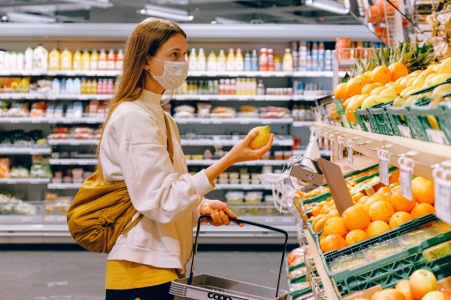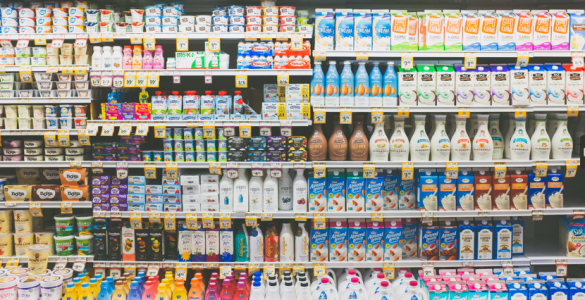Shopper’s Secrets: What you should avoid when taking grocery staples from supermarket shelves
Most of us shop without thinking about where to pick up our groceries. Many of us simply take the first piece of fruit or vegetable on the top of the pile or reach for the nearest milk carton.
Rushing home from work? No worries. Grab that head of broccoli at the front of the bin and toss it in your basket. But hold on a minute, dear SDC members. An important supermarket secret needs your attention.
Believe it or not, the way you pick your produce matters—a lot.
Consumer news journalist Jo Abi suggests that we resist the urge to take groceries from the front and the top of supermarket displays. It sounds bizarre, especially when you're in a hurry and just want to get home, but there is a good reason behind it.
The fruit and vegetables without packaging are exposed to multiple hands, from staff to fellow shoppers who, like you, seek out the best apples and the largest heads of broccoli.
The more hands that handle fresh produce, the faster it tends to ripen and, often, rot. As savvy shoppers, preventing food waste is crucial for the environment and your pocket. The longer your food lasts, the more time you have to savour it before you make another trek to the supermarket.
According to Abi, you should choose fruit and vegetables from the back or the bottom of the pile–provided you don't trigger an orange avalanche on your way. Doing this increases the shelf life of the fresh food you're buying. Be discerning where you pick your produce, and your meals will be fresher.
You might be wondering, dear members: ‘But why don't we buy pre-packed produce?’ Good thinking, but there's a snag.
The same article claims that fruit and vegetables sweating away in plastic bags also tend to rot quicker. The moisture is a breeding ground for bacteria, so there's often no benefit in choosing the prepacked route.
That's not to say you should resign from the convenience of a pre-bagged beans or a pack of apples, just that you keep it in mind when you're browsing the aisles.
For similar reasons, checkout counters generally harbour unwanted bacteria. To avoid this, bring a washable shopping bag to put your vegetables in. It will protect your produce and help the planet. Win-win!
What about dairy items? Fear not. We’ve got some insider tips from Abi.
Avoid grabbing the closest milk carton or cheese block when choosing items from the dairy or other refrigerated sections.
The reason for this is simple: items at the front of the row tend to be less refrigerated, often having shorter use-by dates to get them off the shelves faster.
Choosing from the middle or back of the display stand may increase their lifespan.
Less refrigerated milk may spoil faster, which could be an essential tip for SDC members who like buying larger quantities to save on trips to the store.
The same idea applies to the frozen foods section. We all know the annoyance of opening up our favourite ice cream only to find it's melted, or even worse, melted and refrozen. To avoid this culinary disaster, source your cold treats from the back of the freezer.
In essence, choose carefully when shopping and unpack and store your groceries as soon as possible when you return home.
 Remember, at the SDC, our ultimate goal is to help you make the most of your golden years and your budgets. So, let’s shop smart together!
Remember, at the SDC, our ultimate goal is to help you make the most of your golden years and your budgets. So, let’s shop smart together!
Do you have supermarket secrets to share, dear members? We want to hear them below!
Rushing home from work? No worries. Grab that head of broccoli at the front of the bin and toss it in your basket. But hold on a minute, dear SDC members. An important supermarket secret needs your attention.
Believe it or not, the way you pick your produce matters—a lot.
The fruit and vegetables without packaging are exposed to multiple hands, from staff to fellow shoppers who, like you, seek out the best apples and the largest heads of broccoli.
The more hands that handle fresh produce, the faster it tends to ripen and, often, rot. As savvy shoppers, preventing food waste is crucial for the environment and your pocket. The longer your food lasts, the more time you have to savour it before you make another trek to the supermarket.
According to Abi, you should choose fruit and vegetables from the back or the bottom of the pile–provided you don't trigger an orange avalanche on your way. Doing this increases the shelf life of the fresh food you're buying. Be discerning where you pick your produce, and your meals will be fresher.
The same article claims that fruit and vegetables sweating away in plastic bags also tend to rot quicker. The moisture is a breeding ground for bacteria, so there's often no benefit in choosing the prepacked route.
That's not to say you should resign from the convenience of a pre-bagged beans or a pack of apples, just that you keep it in mind when you're browsing the aisles.
For similar reasons, checkout counters generally harbour unwanted bacteria. To avoid this, bring a washable shopping bag to put your vegetables in. It will protect your produce and help the planet. Win-win!
What about dairy items? Fear not. We’ve got some insider tips from Abi.
Avoid grabbing the closest milk carton or cheese block when choosing items from the dairy or other refrigerated sections.
The reason for this is simple: items at the front of the row tend to be less refrigerated, often having shorter use-by dates to get them off the shelves faster.
Choosing from the middle or back of the display stand may increase their lifespan.
Less refrigerated milk may spoil faster, which could be an essential tip for SDC members who like buying larger quantities to save on trips to the store.
The same idea applies to the frozen foods section. We all know the annoyance of opening up our favourite ice cream only to find it's melted, or even worse, melted and refrozen. To avoid this culinary disaster, source your cold treats from the back of the freezer.
In essence, choose carefully when shopping and unpack and store your groceries as soon as possible when you return home.
Key Takeaways
- Consumer journalist Jo Abi shared shopper secrets to avoid in the supermarket: getting produce from the front of fruit and vegetable displays due to potential contamination and faster rotting from multiple touches.
- Pre-packed produce tends to rot faster due to sweating in sealed plastic bags, making selecting individual items a better choice.
- Always opt for items from the middle or back of the refrigerated and frozen sections, as they are better-taken care of and will likely last longer.
- Be diligent in using, unpacking and storing groceries properly upon arriving home to extend their useful life and avoid wastage.
Do you have supermarket secrets to share, dear members? We want to hear them below!









